The Woman Behind the Federal Budget Hopes Her Work Makes a Statement: ‘It’s Anything but a Financial Document’
Shalanda Young, a small-town Louisiana native, has earned bipartisan respect for her budgeting finesse — and with all eyes on the economy, her ability to fight for everyday Americans is more crucial than ever
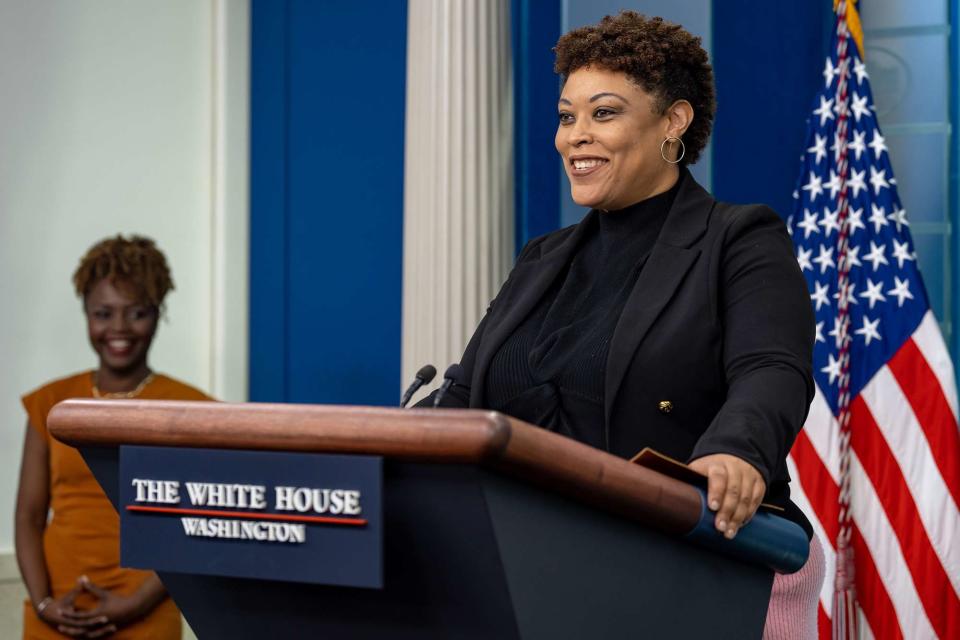
Official White House Photo by Cameron Smith
Shalanda Young, director of the Office of Management and Budget, holds a press briefing on May 4, 2023When Shalanda Young talks about her duty to craft the national budget, she's quick to cite one of President Joe Biden's mantras: Don't tell me what you value. Show me your budget and I'll tell you what you value.
For the rural Louisiana native — who has seen how entire U.S. populations can be misunderstood by suits in Washington — it's become a guiding principle as she pieces together a values-based spending plan that aims to do the most good for the largest number of Americans.
"All that we do, especially through the budget and economic framework, is about this ethos: middle out, bottom up," says Young, director of Biden's Office of Management and Budget. "We tried to trickle it down, and it didn't work. Giving tax breaks to the 1% and 2% did not find its way to workers in this country."
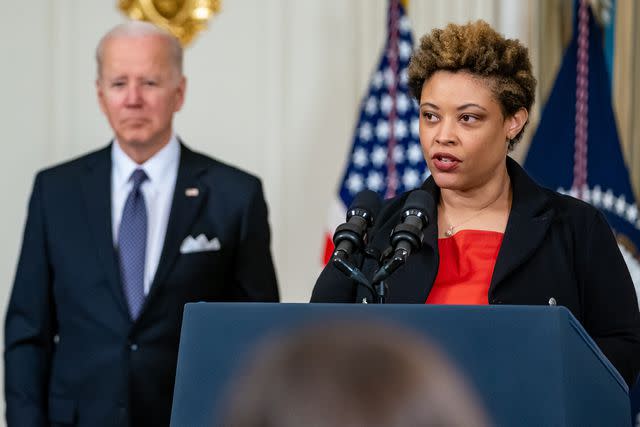
Official White House Photo by Carlos Fyfe
Shalanda Young speaks in the White House State Dining Room on March 28, 2022, before President Joe Biden announces the 2023 budgetThe president's 2025 budget plan — set for release on Monday — addresses several issues that Young has seen and felt firsthand. Americans can expect her office to propose a wide range of solutions that would ease the financial burden on parents, minimize inequities and better serve rural communities.
"If you're from the city, it's hard for you to appreciate how difficult it can be, especially in communities like I'm from that don't have a strong economic base in town," Young, 46, tells PEOPLE. Her hometown of Clinton, Louisiana, doesn't have factories or agriculture to help drive the economy, and in turn, locals lack some of the necessary resources that others take for granted, like close access to medical care.
Young recently lost a loved one back home after he had to be medevaced out of town to the nearest hospital, and her family will always be left wondering if having nearby care options could have saved him. It's just one example she provides of the "extreme challenges" people all over the country face when it comes to economic and health care security.
Related: $580 Billion and a 'Huge' Amount of Potential Changes: What Biden's Infrastructure Deal Means
"When we have regulations that impact our health care system or our economic system, we have people in the room who are diverse, not just from a racial perspective, but also from a location perspective," she explains of her staff. "Like, 'Hey guys, that doesn't work in a rural community. ... We don't have that infrastructure.'"
In a D.C. bubble that can easily lose touch with the nation it serves, those unique lived experiences play a key role in shrinking blind spots as Young's office establishes the administration's funding goals.
Related: President Biden's Energetic State of the Union Brings Him Best Fundraising Hours of 2024 Campaign
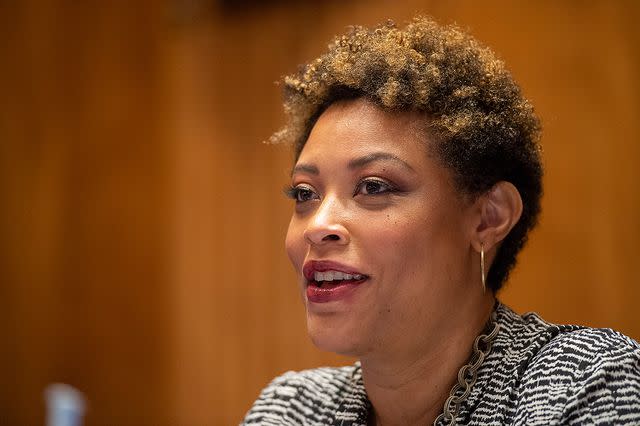
A president's budget touches on every aspect of American life, and Young is plenty aware of what needs improved. "I come from a family that does not mind telling me if they think prices are too high and give me some thoughts about what Joe Biden needs to work on," she admits with a smile. When she needs a temperature check, she picks up the phone and calls her 95-year-old grandmother in Clinton to hear it straight.
"She does not pull any punches, including what she thinks could be improved on by my boss," Young says. "She is more up on the news than most other people and has a lot of opinions on what we should be talking about in this country. And that's important for all of us [in Washington], to maintain that connection ... People here have to remember how regular people behave and shop and think and feel."
Young has also come to understand, as the mother of a 2-year-old daughter, that paying for child care you trust is not as simple a task as it should be, and parenting often requires people to sacrifice their own needs in order to provide for their kids. "I say every day, 'I don't know how people do it,'" she shares. "It is incumbent upon us to have government policies that help those families do the best they can for their children."
Related: Working Moms in the White House on How They're Confronting the COVID 'Caregiving Crisis'
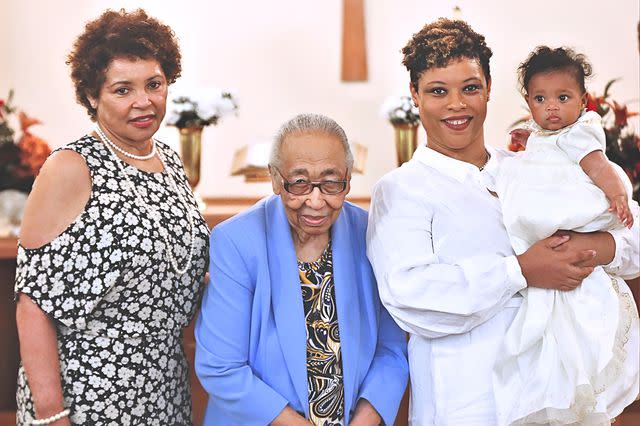
Felicia Brumfield Gathe/Sweet Sunshine Photography
Shalanda Young (third from left) stands with her mother, grandmother and daughterWith these priorities in mind, her office's budget proposal calls for raising taxes on corporations and billionaires in order to lower taxes for others and trim the deficit by $3 trillion. It puts a lot of weight on reducing the cost of raising children, including making child care and Head Start programs more accessible. It has plans to boost U.S. manufacturing and create clean jobs, which would have the added benefit of helping to revitalize small towns.
It also aims to grow the Pell Grant program, expand free community college access and limit student debt. It pushes to continue reducing prescription costs and junk fees, and make housing, utilities and high-speed internet more attainable. And it would protect cuts to Social Security and Medicare.
Related: Joe Biden Announces New Plan to Aid with Student Debt Relief After SCOTUS Axed First Attempt
But in a hyper-partisan Congress, where House Republicans are still fighting over 2024 funding, it's a tall ask.
"President's budgets, the way the United States process works, are never adopted fully. They are a starting place to spark discussion, especially on programs. You want Congress to start having hearings and really give it some substantive thought," Young says. "Some of it won't get enacted, but I've seen things that have been introduced, and it might take three years, it might take four years, but we get there. And it is worth starting that dialogue."
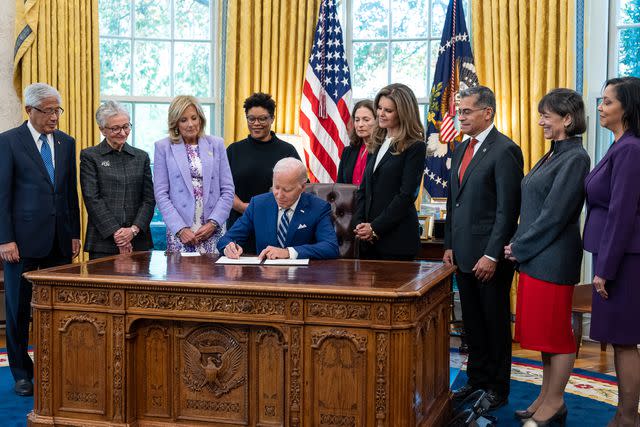
Official White House Photo by Adam Schultz
President Biden signs a memorandum on women's health research in the Oval Office on Nov. 13, 2023. OMB Director Shalanda Young stands just behind him, on the leftYoung is the first woman of color to lead the Office of Management of Budget, following a long line of directors that are overwhelmingly White and male. When Biden nominated her for the role, she already had 15 years of experience under her belt working with the House Appropriations Committee, which is responsible for pushing final budget legislation through Congress.
"I have a unique perspective in that I've had to receive [spending plans] and I know the reactions that this is going to have," she says of the 2025 budget proposal. Fortunately, even as she anticipates pushback from Republicans, she earned bipartisan respect during her time on the congressional side by proving she's willing to meet in the middle — including when she helped end the nation's longest government shutdown in 2019.
Related: Trump Says He 'Can Relate' to Government Workers with No Pay in Shutdown: 'They'll Make Adjustments'
“Even for a Democrat, she's got this fantastic understanding of how House Republicans think and operate,” GOP Rep. Patrick McHenry told Time magazine in February, noting that they bonded over parenting young kids during tense negotiations to reach a spending deal last summer. "She knows the details of all the accounts you can possibly know in government, but more importantly, she understands what a deal looks like."
During a confirmation hearing after her initial appointment as deputy director of the Office of Management and Budget, even Sen. Lindsey Graham — then the top Republican on the Senate Budget Committee — said, “Everybody that deals with you on our side has nothing but good things to say. You might talk me out of voting for you, but I doubt it.”
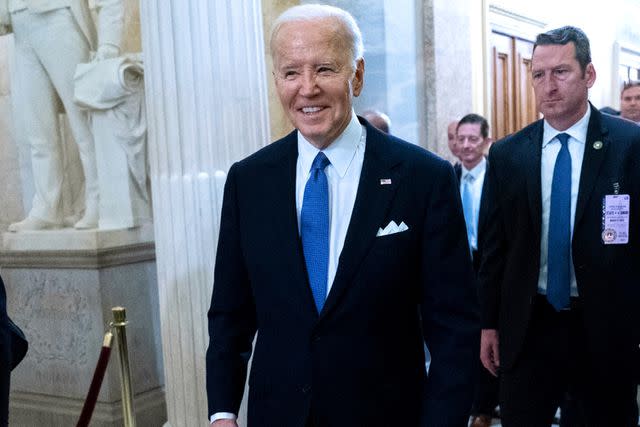
Chris Kleponis/CNP/Bloomberg via Getty Images
President Joe Biden arrives at the U.S. Capitol for his State of the Union address on March 7, 2024Young knows there could be a long road ahead before the Biden administration's goals are realized, but she insists that she's buckled up and ready to remind Americans "not just what we have in the works, but what we're fighting for."
"People want better for their children than what they have ... and they want their government to be there to make it a little bit easier. To make their money go further. To not put up roadblocks," she says. "It's on us as the government to make sure they can have that. And both parties have different perspectives on how to get there, but I also believe in working across the aisle and finding compromise."
Never miss a story — sign up for PEOPLE's free daily newsletter to stay up-to-date on the best of what PEOPLE has to offer.
With the president's blessing to fight for communities like Clinton, Louisiana — who are waiting for more proof that an economic comeback is possible — she will now head to Capitol Hill and make her case.
"The budget is anything but a financial document. It's what the president should be judged by: where you put your next dollar," she says. "I'm lucky I get to work for a president whose values I share."
For more People news, make sure to sign up for our newsletter!
Read the original article on People.


